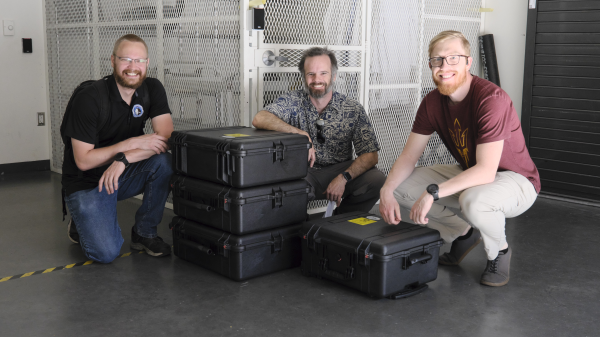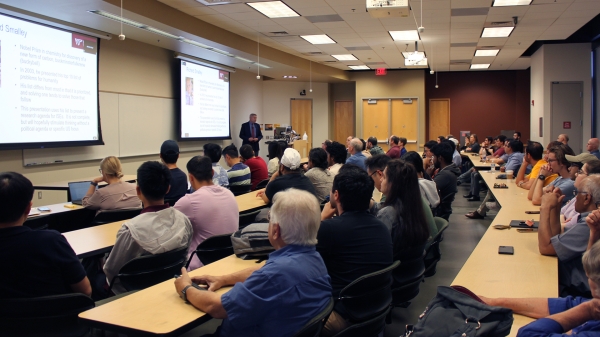Can parenting skills prevent childhood obesity?
ASU researchers receive USDA grant for just under $2.5 million to implement intervention aimed at parents of at-risk young children

Researchers in Arizona State University’s Department of Psychology received a five-year grant for just under $2.5 million from the USDA to implement an intervention program that targets childhood obesity in a novel way: by teaching parenting skills.
In the United States, approximately 9 percent of children ages 2–5 years and 17 percent of children ages 6–11 years are obese. Childhood obesity can lead to lifelong health problems, even early death, and is linked to greater rates of depression and mental illness in young children and teenagers. Children who are ethnic minorities and who come from low-income families are the most likely to be obese.
Cady Berkel, associate research professor of psychology, and Justin D. Smith, who was a postdoctoral scientist in the ASU psychology department and is now an assistant professor at Northwestern University, are the lead investigators on the grant, which begins July 1.
The Family Check-Up 4 Health program
Berkel and Smith are trying to reach at-risk children ages 2–8 years before unhealthy eating and physical activity habits become established. The centerpiece of their project is the Family Check-Up 4 Health (FCU4Health) program. The FCU4Health program relies on medical offices or clinics throughout the Phoenix metropolitan area that offer integrated primary care and behavioral health services.
“The FCU4Health program is a unique childhood-obesity prevention program because it focuses on the parents to reach the kids,” said Berkel, who is also part of the ASU Research and Education Advancing Children’s Health (REACH) Institute.
Research on childhood obesity shows that simply informing parents about healthy eating habits and the importance of physical activity is ineffective at preventing or overcoming obesity in children. Berkel said parents might already have information about how important physical activity and nutritious foods are to their child, but actually changing a child’s diet and behavior can be difficult.
Parenting as a long-term intervention
Like other REACH Institute programs, the motivation behind the FCU4Health program is that parenting skills are teachable.
“Parenting skills are really a longitudinal intervention that happens across the life span,” Berkel said. “Because parents can give children an ongoing ‘dose’ as they grow up, teaching parenting skills is a robust and long-lasting intervention for childhood obesity.”
In the FCU4Health program, families meet with an on-site health coordinator, who has been trained by scientists in ASU’s REACH Institute. The coordinator teaches the parents skills that will help them implement the pediatrician’s advice. Such skills might be as simple as providing praise when a child makes healthy choices.
“We know families are the center of children’s health,” Smith said, “and teaching parents to do the things we know benefit kids in the long-term is an effective intervention.”
Some of the parenting skills taught in the FCU4Health program are setting limits, managing children’s screen time and rewarding positive behaviors.
“Many of the parenting skills we teach in the FCU4Health program are not just relevant to health,” Smith said. “These parenting skills are generally applicable and can lead to other positive benefits for families.”
The future of FCU4Health
Berkel and Smith’s project will study how effective the FCU4Health program is at preventing obesity in young children and will estimate how much money the program could save the health care industry. Another goal of the project is to broadly disseminate strategies parents can use to support healthy behaviors in young children.
“Our goal is to create an online learning course about the FCU4Health program that could serve as continuing medical-education credits for health care providers and hopefully help them understand the power of teaching parenting skills to improve patient compliance,” Berkel said. “We would also want psychology students, nutrition students and community providers to have access to the online course.”
Berkel and Smith will be supported by other ASU scientists. Meg Bruening, assistant professor in the School of Nutrition and Health Promotion, will oversee the nutrition information included in the online learning courses, and Anne Mauricio, associate research professor of psychology and implementation scientist in the REACH Institute, will help with the training and education of the health care professionals. Kevin Grimm, professor of psychology, will serve as the biostatistician for the project.
Top photo by Thiago Cerqueira
More Science and technology

SPARCS mission spacecraft bus delivered to ASU for final assembly
The Arizona State University team that is building the NASA-funded Star-Planet Activity Research CubeSat, or SPARCS, cleared a major milestone this week — receiving its spacecraft bus at the School…

Associate professor shares her journey from NASA to ASU
From leading space missions to designing and building spaceflight hardware and training students in space science and engineering, Arizona State University is proving that space is more than a…

Famed systems engineer inspires ASU to tackle global problems
“Providing great talent with great opportunity can make a great difference.” Such was a key part of the message delivered by G. Don Taylor, executive vice provost and the Charles O. Gordon Professor…